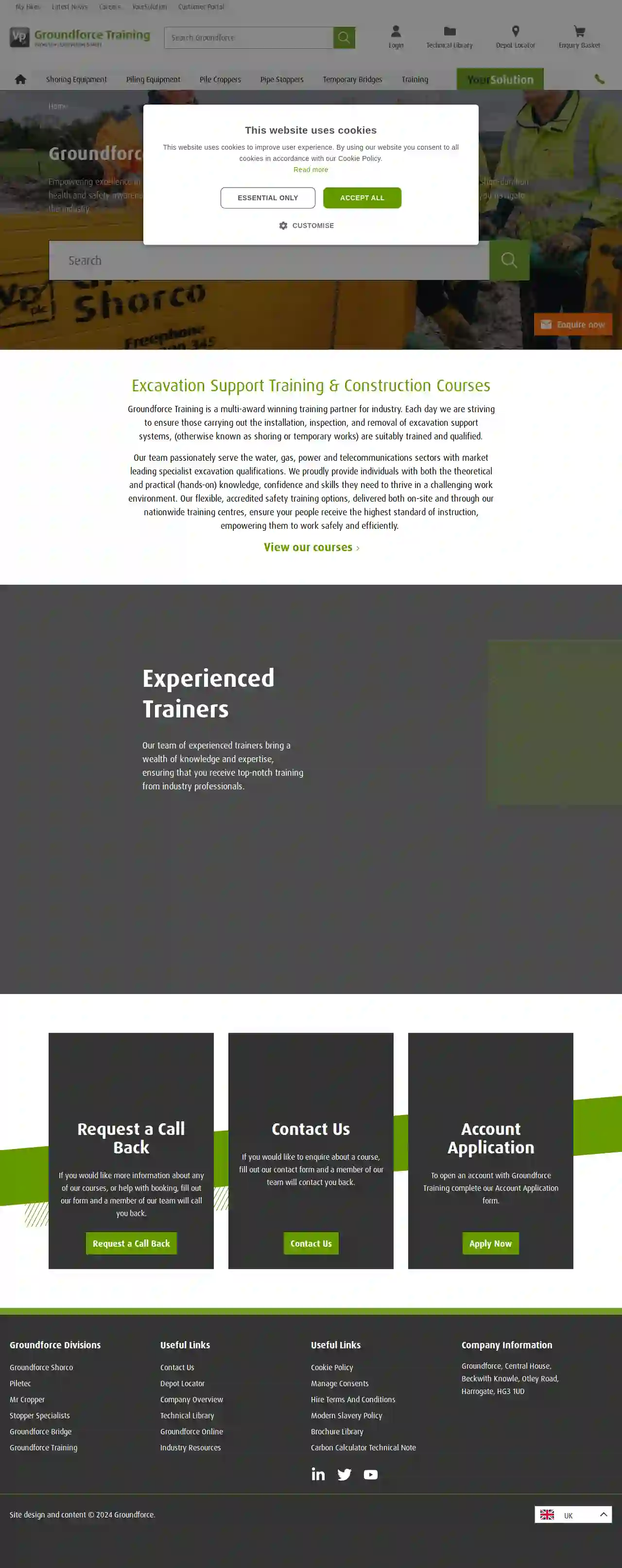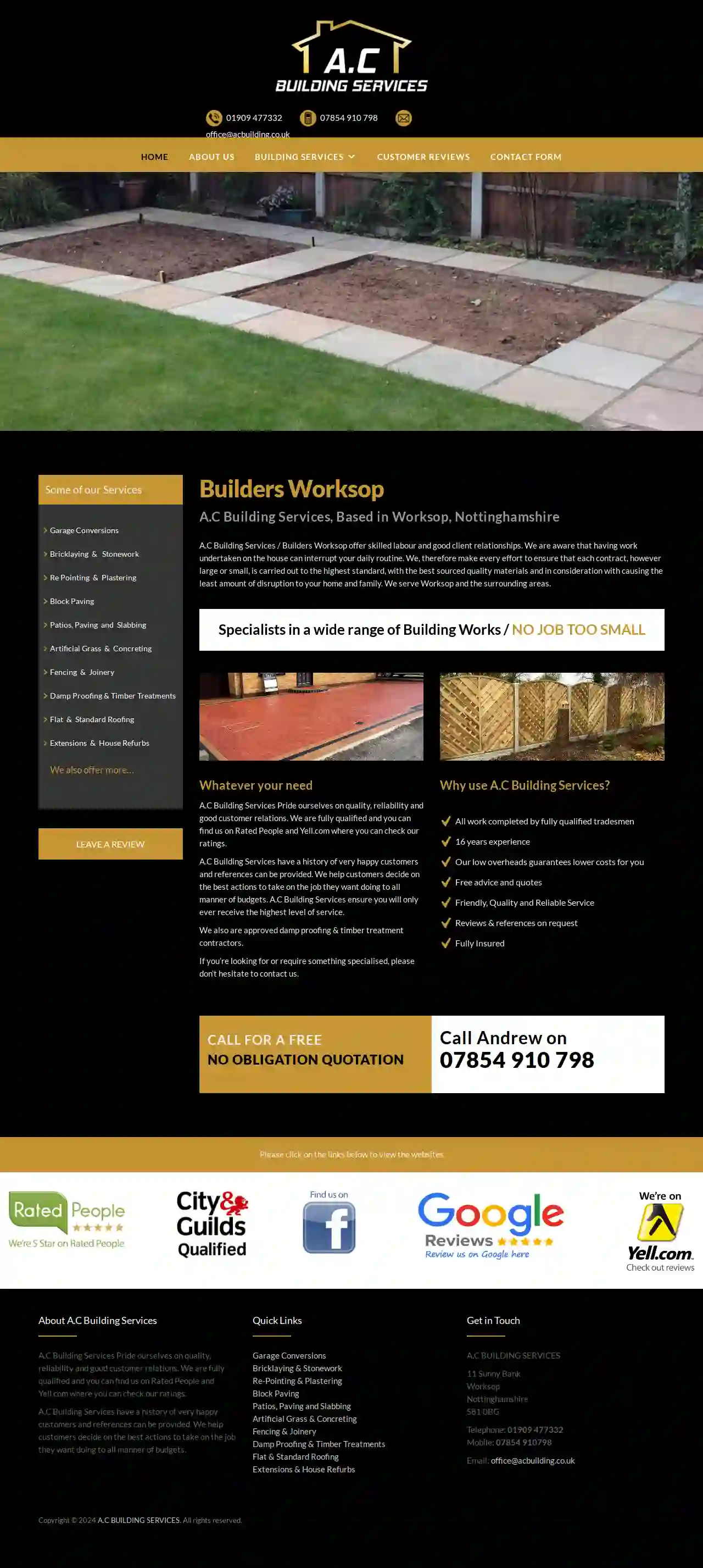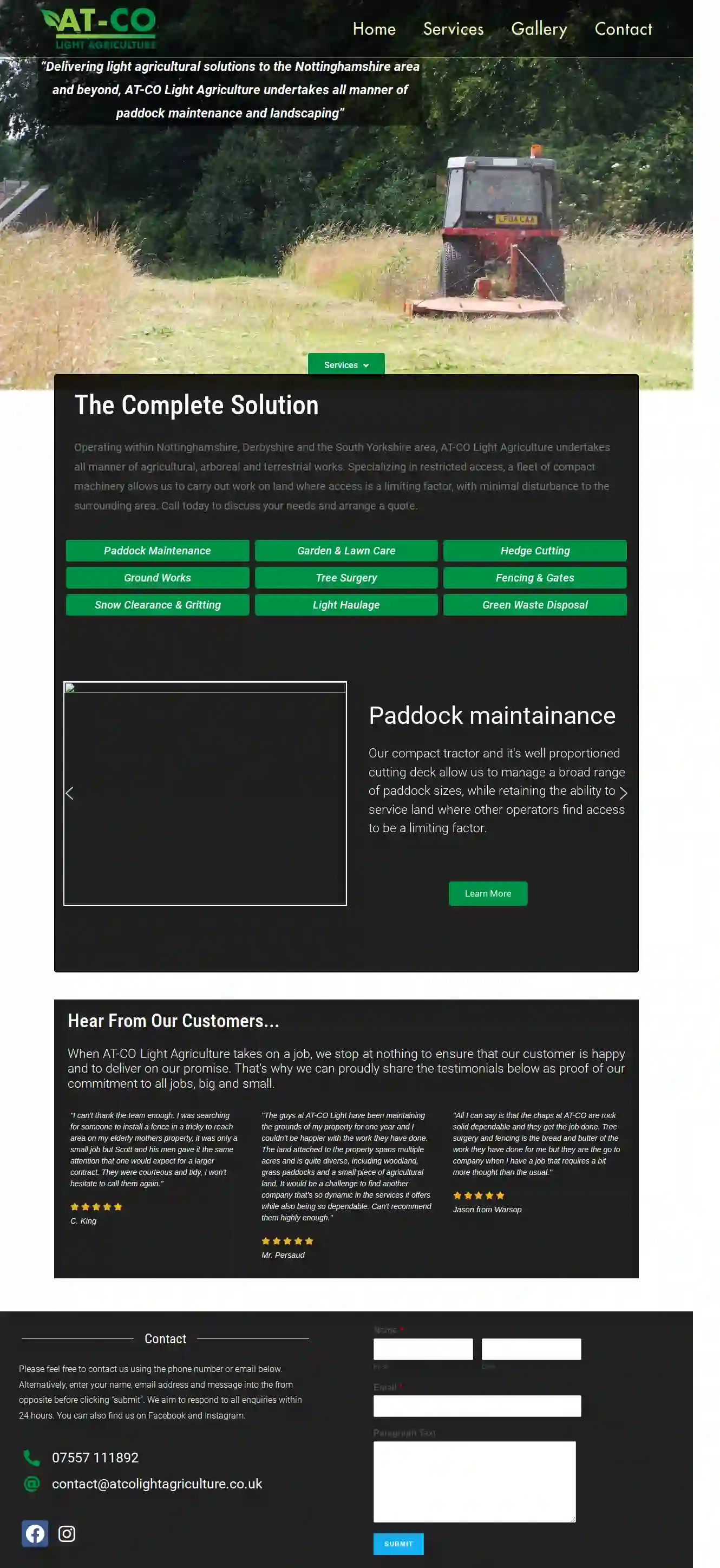Excavation Contractors Worksop
Top 10 Excavation Contractor in Worksop
Get multiple Land Excavation quotes for your project today! Compare profiles, reviews, accreditations, portfolio, etc... and choose the best service.
- EA
EA Groundworks Ltd
51 reviewsWorksop, GB- Services
- Why Us?
Get Quote 
Groundforce Training Services - Excavation Safety
4.9389 reviewsCentral House, Beckwith Knowle, Otley Road, Harrogate, HG3 1UD, GBGroundforce: Your Partner in Safety and Efficiency Groundforce is a leading provider of shoring, piling, and excavation safety solutions. We offer a wide range of products and services to meet the needs of our customers in the construction, infrastructure, and utilities sectors. Our commitment to safety and efficiency is reflected in everything we do, from the design and manufacture of our products to the training we provide to our customers. Our History Groundforce has been in business for over 50 years, and we have a long history of providing innovative and reliable solutions to our customers. We are constantly investing in research and development to ensure that our products and services are at the forefront of the industry. Our Mission Our mission is to provide our customers with the safest and most efficient solutions possible. We are committed to providing our customers with the highest level of service and support. We believe that our customers are our most valuable asset, and we are dedicated to building long-term relationships with them. Our Team Our team is made up of experienced professionals who are passionate about safety and efficiency. We are committed to providing our customers with the best possible experience. We are always available to answer your questions and provide you with the support you need.
- Services
- Why Us?
- Accreditations
- Gallery
Get Quote
A.C Building Services
520 reviews11 Sunny Bank, Worksop, S81 0BG, GBAbout A.C Building Services A.C Building Services pride ourselves on quality, reliability and good customer relations. We are fully qualified and you can find us on Rated People and Yell.com where you can check our ratings. A.C Building Services have a history of very happy customers and references can be provided. We help customers decide on the best actions to take on the job they want doing to all manner of budgets. We also are approved damp proofing & timber treatment contractors. If you’re looking for or require something specialised, please don’t hesitate to contact us.
- Services
- Why Us?
- Gallery
Get Quote- Wl
Wlabs
4.416 reviewsWorksop, GB- Services
- Why Us?
Get Quote - Ko
Kobi construction Ltd
53 reviewsWorksop, GB- Services
- Why Us?
Get Quote - Bl
Blagg Plant Hire
51 reviewsWorksop, GB- Services
- Why Us?
Get Quote - Dr
Dropped Kerb Specialists Worksop
1Worksop, GB- Services
- Why Us?
Get Quote 
AT-CO Light Agriculture
1Worksop, GBDelivering light agricultural solutions to the Nottinghamshire area and beyond, AT-CO Light Agriculture undertakes all manner of paddock maintenance and landscaping. Operating within Nottinghamshire, Derbyshire and the South Yorkshire area, AT-CO Light Agriculture undertakes all manner of agricultural, arboreal and terrestrial works. Specializing in restricted access, a fleet of compact machinery allows us to carry out work on land where access is a limiting factor, with minimal disturbance to the surrounding area. Call today to discuss your needs and arrange a quote.
- Services
- Why Us?
- Testimonials
- Gallery
Get Quote- Wo
Worksop Tarmacadam Co Ltd
1.88 reviewsWorksop, GB- Services
- Why Us?
Get Quote - Mi
Mini Skip Hire
1Worksop, GB- Services
- Why Us?
Get Quote
Over 11,537+ Excavation Contractors registered
Our excavation contractors operate in Worksop and surrounding areas!
ExcavationHQ has curated and vetted the Best Excavation Contractors near Worksop. Find the most reliable business today.
Frequently Asked Questions About Excavation Contractors
- Project Size and Scope: Larger, more complex excavations naturally take longer.
- Soil Conditions: Rocky or challenging soil types can slow down progress.
- Site Accessibility: Limited access might require more time for maneuvering equipment and hauling materials.
- Weather: Inclement weather can cause delays.
- Permitting and Inspections: Waiting for permits or inspections can extend the timeline.
- Clearly Define the Scope: Outline the project's goals, including the excavation area, depth, grade, and intended use.
- Obtain Necessary Permits: Research and acquire any required permits from your local authorities.
- Mark Utility Lines: Contact your utility companies to locate and mark underground utilities to prevent damage.
- Communicate with Neighbors: Inform your neighbors about the project's timeline and potential noise or disruptions.
- Prepare the Site: Clear any obstacles, such as vegetation, furniture, or structures, from the excavation area.
- Discuss Safety Protocols: Review safety procedures with the contractor to ensure a safe work environment.
How long does an excavation project take?
What is the difference between cut and fill excavation?
Cut: Involves excavating soil from an area where the existing grade is higher than the desired grade.
Fill: Refers to using the excavated soil ('cut' material) to raise the grade in an area where the existing grade is lower than desired.
This method minimizes the need to import or export soil, reducing costs and environmental impact. It's commonly used for site preparation, road construction, and landscaping.
What should I do before excavation starts?
What is the difference between topsoil and subsoil?
Topsoil: The uppermost layer, typically rich in organic matter, nutrients, and microorganisms. It's essential for plant growth and is often darker in color.
Subsoil: The layer beneath the topsoil, containing less organic matter and generally denser. It provides support for roots but is less fertile than topsoil.
During excavation, topsoil is often removed and preserved separately for later use in landscaping, while subsoil is typically used for backfilling or other less demanding applications.
How long does an excavation project take?
- Project Size and Scope: Larger, more complex excavations naturally take longer.
- Soil Conditions: Rocky or challenging soil types can slow down progress.
- Site Accessibility: Limited access might require more time for maneuvering equipment and hauling materials.
- Weather: Inclement weather can cause delays.
- Permitting and Inspections: Waiting for permits or inspections can extend the timeline.
What is the difference between cut and fill excavation?
Cut: Involves excavating soil from an area where the existing grade is higher than the desired grade.
Fill: Refers to using the excavated soil ('cut' material) to raise the grade in an area where the existing grade is lower than desired.
This method minimizes the need to import or export soil, reducing costs and environmental impact. It's commonly used for site preparation, road construction, and landscaping.
What should I do before excavation starts?
- Clearly Define the Scope: Outline the project's goals, including the excavation area, depth, grade, and intended use.
- Obtain Necessary Permits: Research and acquire any required permits from your local authorities.
- Mark Utility Lines: Contact your utility companies to locate and mark underground utilities to prevent damage.
- Communicate with Neighbors: Inform your neighbors about the project's timeline and potential noise or disruptions.
- Prepare the Site: Clear any obstacles, such as vegetation, furniture, or structures, from the excavation area.
- Discuss Safety Protocols: Review safety procedures with the contractor to ensure a safe work environment.
What is the difference between topsoil and subsoil?
Topsoil: The uppermost layer, typically rich in organic matter, nutrients, and microorganisms. It's essential for plant growth and is often darker in color.
Subsoil: The layer beneath the topsoil, containing less organic matter and generally denser. It provides support for roots but is less fertile than topsoil.
During excavation, topsoil is often removed and preserved separately for later use in landscaping, while subsoil is typically used for backfilling or other less demanding applications.